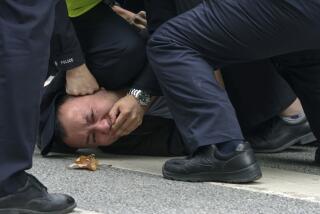Chinese Break Law to See Popular Corruption Show
- Share via
BEIJING — Corruption and crime are such hot issues in China these days that people are willing to break the law to see them.
Tickets for the Beijing Anti-Corruption and Bribery Exhibition, for example, sold out soon after the show opened last week, according to its official sponsor, the special state prosecutor’s office. In some cases, factories or government departments purchased tickets for their entire work forces.
But ticketless folks had no problem getting into the crime show on a recent morning. Illegal scalpers were plentiful outside the museum, selling entries for six times the original price (about 30 cents).
The exhibit, at the Chinese People’s Military Museum, is closed to foreigners because of the negative picture it presents of officialdom.
But the prosecutor’s office claims that more than 20,000 citizens come daily to the museum to see case histories and photographs of corrupt officials and white-collar criminals.
Uniformed guides provide commentary. In front of the photograph of one convicted official, said a man who attended the exhibition, the guide reports that the wrongdoer’s jet-black hair “turned snow-white as soon as he was arrested.”
Another display features photographs of the handsome white-collar criminal Wang Feng, including one in which he is sipping brandy while surrounded by adoring and beautiful women. According to the case history, Wang once spent 1 million yuan--the equivalent of $120,000--on a single night’s entertainment in a karaoke bar.
Wang, manager of a government-owned trading firm, was convicted in 1993 of obtaining 21 illegal bank loans totaling $60 million and using them for private pleasures. When police arrested Wang and his cohorts, they had only $4 million left.
Such details stunned some of the visitors to the exhibit.
“I was shocked by the amount of money,” said a young bookkeeper from Hubei province who attended the show with her fiance, an air force enlisted man on leave from Inner Mongolia.
Others may have been attracted by the accounts of corruption and high living. The Chinese capital, it seems, has an insatiable appetite for crime news.
Crime reporting in daily newspapers has increased noticeably. Recent stories in Beijing have detailed police shootouts with armed hoods, a crackdown on railroad-ticket counterfeiters and a vice raid on prostitutes in a luxury hotel.
One of the most popular shows on television since it began airing in April is “Broadcast Focus”--a prime-time investigative news show that reports on such subjects as child abuse in public day-care centers, battered women, restaurant hygiene and public corruption.
In the restaurant episode, reporters proved that a local eatery was reusing disposable wooden chopsticks by gluing them together to make them look new. In the child-abuse segment, the reporters exposed a provincial day-care worker who punished a 3-year-old girl for bed-wetting by beating her and burning her with cigarettes.
But the most popular broadcasts, according to producer Sun Yusheng, are those on official corruption. “Corruption is the hot topic these days,” Sun said in a telephone interview.
One of his most recent shows focused, in fact, on the Anti-Corruption and Bribery Exhibition at the Military Museum. The exhibition was set up by the special prosecutor to demonstrate the government’s firm resolve in combatting the corruption and white-collar crime sweeping China.
Even senior Chinese officials admit that corruption has become rampant since senior leader Deng Xiaoping began liberalizing the economy in the early 1980s. The official explanation is that corruption is an unpleasant side effect of a market economy.
But with 90-year-old Deng ailing, many senior officials fear that the corruption issue could turn against them in the succession battle that will inevitably follow his death.
The impression that senior public officials are considered beyond the law is deeply rooted here. A recent public debate over stringent new laws governing dog ownership in Beijing, for example, included a demand from one resident that the new rules also apply to “high-ranking officials living in independent compounds, so that it will not ruin their reputation in the minds of ordinary citizens.”
According to the official program sold at the door of the exhibition, the Beijing special prosecutor’s office has handled 2,143 cases of corruption since 1990. The cases have involved 41 senior officials, including two vice ministers.
Not everyone at the exhibition was convinced that the prosecutor had netted all the bad guys.
One government employee who attended the show eavesdropped on two elderly men, both former bureaucrats, as they walked through the displays.
“It’s not very big,” said the first.
“No,” agreed his friend. “Most of the bigger crooks are still hidden.”
“What about you?” said the first man.
“I’m not hidden,” replied the friend. “I’m retired.”
More to Read
Sign up for Essential California
The most important California stories and recommendations in your inbox every morning.
You may occasionally receive promotional content from the Los Angeles Times.













